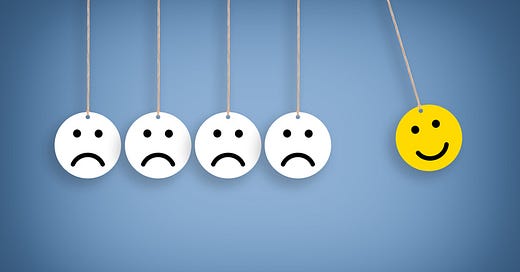Mental health: What is it, how many have good/bad mental health, how do you improve it
What is it?
It might seem like a simple question, ‘what is mental health?’, but when you get into it, it’s a lot more nuanced than you might think. So, let’s unpack. What comes to mind when you think of the words ‘mental health’? It might be that it’s all about trying to be as happy as possible, but then that very quickly falls apart when you realize that it’s impossible to be happy all the time, which would therefore make it impossible to have good mental health all the time which seems a bit counterintuitive. So, then you might think that it’s just about feeling normal all of the time. But this brings up even more questions what is ‘normal’ anyway? Maybe we need some help with this one, so let’s have a look at what the experts think.
Early psychologists, psychiatrists and therapists defined mental health as the presence or absence of psychological conditions like anxiety, depression, schizophrenia, and so on. They saw their role as helping people alleviate these conditions back to a disease-free state, in other words from -100 back to 0. This is clearly an important and admirable goal, but very few of us would instinctively say that mental health is just about not having some kind of illness. Even the World Health Organization notes that ‘mental health is more than the absence of mental disorders’.
In the year 1998 Martin Seligman set the scene for the positive psychology movement when he announced it as the theme for his presidency of the American Psychological Association. This shifted the narrative on psychology from just addressing disorders and disease, to improving people’s mental health so that they can live their best lives. It’s also where the positive well-being movement came from, choosing to focus more on positive aspects of mental health. So, in other words, we’ve realized that mental health is not just about going from -100 to 0, but going from 0 to +100 as well, thereby including the full range of experiences that people can have.
The World Health Organization’s full definition of mental health is:
a state of mental well-being that enables people to cope with the stresses of life, realize their abilities, learn well and work, well, and contribute to the community
It’s a comprehensive definition but maybe not the pithiest. We much prefer to think of mental health as a state where you can be your best every day. Sure, on some days when the whole world seems like it’s against you, your best is barely being able to get out of bed, have a shower, eat, and get back into bed but that’s OK because it’s the best that you could do that day. On other days it will be the mental state that allows you to nail that work presentation, finally asking them out on a date, or be able to help a struggling friend.
How many have good or bad mental health
Well this depends on definitions. One way to think about mental health measurement (and probably the most accurate) is to measure incidents of mental health conditions. One study reported ‘The global prevalence estimate was 28.0% for depression; 26.9% for anxiety; 24.1% for post-traumatic stress symptoms; 36.5% for stress; 50.0% for psychological distress; and 27.6% for sleep problems.’ Another study reported that burden of mental health disorders as a proportion of the total burden of all disorders was 4.9%. They reckon this is an underestimate yet still puts it in the top 10 leading contributors of disability. That’s a lot of people with mental health issues!
Coming at it from the other direction, the World Happiness Report include the happiness ratings of 200+ countries around the world from a scale of 0-10. The headlines look positive with countries like a Finland, Denmark and Iceland scoring 7.5 and above. However, there’s significant range with Portugal, Korea, and Greece all with scores below 6. Many emerging markets are even lower and Afghanistan comes in last at a shocking 1.86.
All together, these numbers aren’t great. More worryingly, things appear to be getting worse. One study suggested the burden of mental health disorders increased by 50% between 1990 and 2019. So it does look like we have work to do to reduce this trend. These depressing statistics (pun intended) are part of the reason why we started Mibio, to do our bit to fight this mental health pandemic.
How do I improve my mental health?
OK, enough with the negative vibes, let’s talk proactivity. What determines your mental health and how do we ensure we end up on the right side of the spectrum. Well, it’s a bit complicated but let’s cover some of the basics.
To start, there are things in your early life, usually outside of your control that lay the foundations. These include your genetic make-up and upbringing and influence your cognitive and emotional processing to a large degree. Cognitive processing is how you think in response to your daily experience. For example, do you make ‘thinking errors’ when processing what’s happening to you (e.g. black-and-white thinking about negative events). Emotional processing is about feelings and how you respond to emotionally triggering events. Do you feel emotions like anger, jealousy, or anxiety very quickly or do they do they take longer to build? When experiencing these emotions, how quickly do you return to normal– is it quick, or do you get stuck in these moods for many hours, days, weeks, or months?

From the foundation of cognitive and emotional processing, another important factor is lifestyle behaviours. These can improve our resilience and ability to cope with different stressors and are well within our control. They include things like getting enough sleep, having lots of positive social connections, exercising, and looking after your diet and hence your gut microbiome. Do these things enough and you’re likely to be protected against some of the effects of modern stressful life and are likely to have better mental health.
Next come the big culprits, these are stressful events in our lives that we need to manage. This might include things like long days at work, relationship challenges, losing a loved one, and so on. For most of these we’ll be able to manage just fine (some anxiety or feeling of low mood is entirely normal), but in cases of more extreme events (e.g. childhood trauma, experiencing war, etc.) or when exposed to chronic stressors, it can to lead to mental health issues such as anxiety and depression. This is where a healthy set of stress management techniques come in handy (e.g. journaling, meditation, breathwork, etc.). Where these approaches don’t work some sort of clinical treatment might be needed to recover effectively. This can include therapy or medication like antidepressants.
At Mibio, we’re working on a novel approach to mental health focussed on improvements via the microbiome. The microbiome has been linked to mental health in several studies and trying to optimise and re-balance the microbiome has been linked to improvements in things like anxiety and depression.
In summary, mental health is a state of mind that allows you to be your best; globally our mental health seems to be deteriorating, and; in terms of what you can control, it’s mainly about lifestyle, managing stressors, and incorporating clinical options if things become a bit too much. If you’re interested in microbiome-related approaches, do check out our website!
Thanks for reading this post, we’d love to hear what you think: like or leave a comment below. Have we triggered any questions you’d love to unpack? Said something that seems too good to be true? Let us know below.









